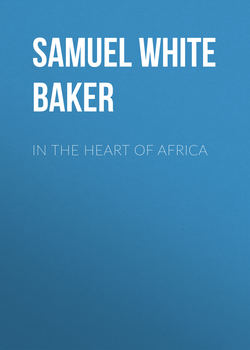Читать книгу In the Heart of Africa - Samuel White Baker - Страница 7
CHAPTER VII
ОглавлениеThe start from Geera—Feats of horsemanship—A curious chase—Abou Do wins a race—Capturing a young buffalo—Our island camp—Tales of the Base.
We started from Geera on the 23d of December, with our party complete. The Hamran sword-hunters were Abou Do, Jali, and Suleiman. My chief tracker was Taher Noor, who, although a good hunter, was not a professional aggahr, and I was accompanied by the father of Abou Do, who was a renowned "howarti" or harpooner of hippopotami. This magnificent old man might have been Neptune himself. He stood about six feet two, and his grizzled locks hung upon his shoulders in thick, and massive curls, while his deep bronze features could not have been excelled in beauty of outline. A more classical figure I have never beheld than the old Abou Do with his harpoon as he first breasted the torrent, and then landed dripping from the waves to join our party from the Arab camp on the opposite side of the river. In addition to my Tokrooris, I had engaged nine camels, each with a separate driver, of the Hamrans, who were to accompany us throughout the expedition. These people were glad to engage themselves, with their camels included, at one and a half dollars per month, for man and beast as one. We had not sufficient baggage to load five camels, but four carried a large supply of corn for our horses and people.
Hardly were we mounted and fairly started than the monkey-like agility of our aggageers was displayed in a variety of antics, that were far more suited to performances in a circus than to a party of steady and experienced hunters, who wished to reserve the strength of their horses for a trying journey.
Abou Do was mounted on a beautiful Abyssinian horse, a gray; Suleiman rode a rough and inferior-looking beast; while little Jali, who was the pet of the party, rode a gray snare, not exceeding fourteen hands in height, which matched her rider exactly in fire, spirit, and speed. Never was there a more perfect picture of a wild Arab horseman than Jali on his mare. Hardly was he in the saddle than away flew the mare over the loose shingles that formed the dry bed of the river, scattering the rounded pebbles in the air from her flinty Hoofs, while her rider in the vigour of delight threw himself almost under her belly while at full speed, and picked up stones from the ground, which he flung, and again caught as they descended. Never were there more complete Centaurs than these Hamran Arabs; the horse and man appeared to be one animal, and that of the most elastic nature, that could twist and turn with the suppleness of a snake. The fact of their being separate beings was well proved, however, by the rider's springing to the earth with his drawn sword while the horse was in full gallop over rough and difficult ground, and, clutching the mane, again vaulting into the saddle with the ability of a monkey, without once checking the speed. The fact of being on horseback had suddenly altered the character of these Arabs; from a sedate and proud bearing, they had become the wildest examples of the most savage disciples of Nimrod. Excited by enthusiasm, they shook their naked blades aloft till the steel trembled in their grasp, and away they dashed over rocks, through thorny bush, across ravines, up and down steep inclinations, engaging in a mimic hunt, and going through the various acts supposed to occur in the attack of a furious elephant. I must acknowledge that, in spite of my admiration for their wonderful dexterity, I began to doubt their prudence. I had three excellent horses for my wife and myself; the Hamran hunters had only one for each, and if the commencement were an example of their usual style of horsemanship, I felt sure that a dozen horses would not be sufficient for the work before us. However, it was not the moment to offer advice, as they were simply mad with excitement and delight.
